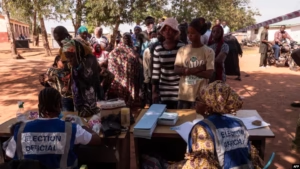Is Ghana democratic participation waning?

Ghana, once heralded as a beacon of democracy in West Africa, faces a moment of reckoning. The low voter turnout in its 2024 presidential and legislative elections has raised questions about the country’s democratic resilience and whether its citizens still view their votes as tools of transformation.
Historically, Ghana has stood tall in a region plagued by political instability. Since returning to constitutional rule in 1992, it has enjoyed peaceful transfers of power and high levels of electoral engagement, with turnout often surpassing 70 percent. Yet, the 2024 elections told a different story. At polling stations in Accra and beyond, the crowds were thinner, the queues shorter, and the enthusiasm muted.
Ahmed Idris of Al Jazeera, reporting from a polling station in Accra, captured the mood succinctly: “Within an hour and a half, everything went quiet.” His observations align with broader trends across the country, where many Ghanaians stayed home, disillusioned by a political system they increasingly see as failing to deliver on its promises.
A Crisis of Confidence
The reasons behind the apparent voter apathy are not hard to find. Ghana’s economic woes have left deep scars. In recent years, the West African nation has grappled with a crippling debt default, runaway inflation, and a $3 billion bailout from the International Monetary Fund. These challenges have eroded trust in both the governing New Patriotic Party (NPP) and the opposition National Democratic Congress (NDC), the two political giants that have alternated power since the 1990s.
In Jamestown, Accra, 68-year-old small trader Comfort Saaquah Aidoo spoke for many when she said, “I want a new government. The old one can’t do the work properly; they promised and failed.” Her sentiment reflects a growing frustration among voters who feel let down by a political class that has been unable to shield them from economic hardship.
While Vice President Mahamudu Bawumia of the NPP campaigned on digitalization and continuity, and John Mahama of the NDC promised to “reset” the economy, their messages failed to energize large segments of the electorate. Apathy seems to have taken root, driven by a perception that neither party can bring about meaningful change.
The Threat to Ghana’s Democratic Model
Low voter turnout in any democracy is concerning, but in Ghana, it strikes at the heart of a proud tradition. This is a nation that has often been cited as a model for the region, a place where democratic participation is seen as both a right and a responsibility.
But the signs of waning engagement are unmistakable. Beyond the economic challenges, a deeper issue of trust is emerging. Citizens increasingly question whether elections can address their concerns or whether the political system itself needs reform.
The government’s decision to temporarily close land borders to ensure electoral integrity underscores the stakes. While the vote was largely peaceful, isolated incidents, such as the fatal shooting at a polling station in Nyankpala, highlight the fragility of Ghana’s democratic fabric.
A Call for Renewal
The low turnout should serve as a wake-up call for Ghana’s leaders. If democracy is to thrive, it must evolve to meet the needs of its citizens. This means not only addressing the immediate economic crisis but also rebuilding trust in institutions and the political process.
The NPP and NDC must recognize that their dominance may no longer be enough to sustain Ghana’s democratic experiment. Citizens want accountability, transparency, and innovative solutions to their problems. The rise of voter apathy suggests that unless these demands are met, Ghana risks joining the ranks of nations where democracy exists in form but not in spirit.
As early results trickle in, both Bawumia and Mahama remain optimistic about their chances. Yet, the real test lies not in who wins, but in how the next government responds to this moment of reckoning. Will they view it as a mandate for change or a reason to continue with business as usual?
For Ghana, the stakes are clear. Its reputation as a democratic trailblazer is on the line. Whether the country can reinvigorate its democratic participation will determine not just its future, but also its standing as an example for the rest of the continent.
The 2024 elections may be over, but the fight to restore faith in democracy is only just beginning.








